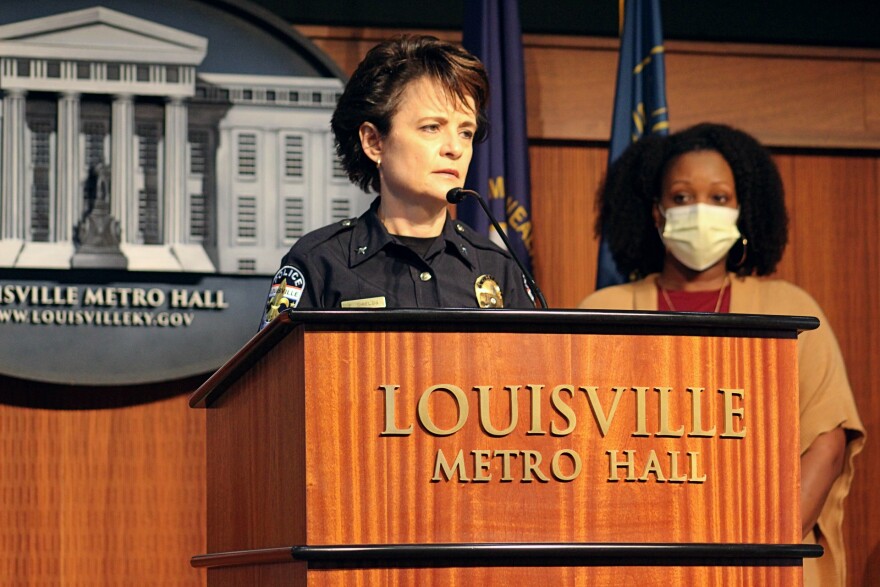Louisville’s top public safety officials, including Police Chief Erika Shields, are expected to give an update to Metro Council Monday evening on the ongoing U.S. Department of Justice investigation into the city’s policing.
The DOJ announced in April that it was initiating a “pattern or practice” investigation of the Louisville Metro Police Department and Metro Government. The investigation focuses on whether Louisville has a pattern or practice of discriminatory policing and violating residents’ constitutional rights. It’s a sweeping investigation that’s looking at everything from arrest paperwork to organizational charts and training documents.
Metro Council President David James, who represents District 6, said council members are hoping to learn more about what to expect once the DOJ issues its final report.
“We wanted to make sure that council members are up-to-date on some of the things the DOJ were looking at and some of the things we’ll need to pay for going forward,” he said. “There had not been those public discussions, and we just want to be transparent and let the community hear all that.”
James said Metro Council is particularly interested in understanding what the cost of DOJ-recommended reforms might be, since council members would need to approve any new spending.
“Some of the activists, you’ll often hear them say, ‘Reduce the police department’s budget! Reduce the police department’s budget,” James said. “Well we’re going to be increasing the police department’s budget to pay for all of these reforms."
It’s currently unclear when the DOJ will wrap up its investigation. The agency did not respond to WFPL’s request for an update last month.
Louisville State Representative Attica Scott (D-41) said she met with DOJ representatives last week. Sheshared notes from the meeting on social media that indicated the investigation is still ongoing and is a purely civil, not criminal, investigation.
“I did ask again for the DOJ to share a public update with our community,” Scott wrote on Twitter. “It’s vitally important that people, other than politicians, have the opportunity to hear directly from and engage directly with the DOJ and its investigation into LMPD.”
Scott added that the DOJ said it is not investigating the LMPD police union, Fraternal Order of Police Lodge 614.
What reforms will the DOJ recommend?
It’s impossible to know what kind of recommendations the DOJ will make to improve LMPD until a final report is published. But in a September update about how LMPD is instituting the recommendations of the Hilliard Heintz report, Shields told Metro Council’s Public Safety Committee that the DOJ will likely make similar recommendations.
The Chicago-based firm Hilliard Heintz was hired by the city following the police killing of Breonna Taylor to do a holistic audit of the department’s systems and practices. They published their report in January, which found LMPD was in “crisis.”
The report recommended increasing community outreach, developing a civilian review board for police misconduct and prioritizing de-escalation and defensive tactics training, among other measures.
“So we are already going to have in play, in motion multiple efforts that will also be parroted in the DOJ report,” Shields said. “The DOJ report will elaborate on each recommendation far more extensively.”
According to LMPD’s Hilliard Heintz dashboard, less than 4% of their recommendations have been implemented so far. Roughly 57% of recommendations are in progress and another 31% are still in the “planning and review” process.
Shields said she expects the DOJ report will echo the Hilliard Heintz recommendation that LMPD create an internal “performance review board." The board is expected to operate essentially as a real-time peer review for officers.
“I think one of the difficulties that you have in law enforcement is the delay between discipline, counseling and feedback to the employee on their conduct,” she said. “This is like OK, we know you have an investigation or an accusation hanging out there, but we’re going to be discussing your behavior and your decision making, good or bad, immediately.”
Shields did not provide any more information about how the performance review board would operate or who inside LMPD would be conducting the reviews. She said LMPD is currently working with other agencies that were investigated by the DOJ in the past to identify the best way to create the board.
Another recommendation Shields expects the DOJ to make is the creation of an “early warning detection system.” She explained to Metro Council that the system, once it’s implemented, would identify officer behaviors that could lead to bigger issues down the road.
“So what are the early identifiers that should be viewed as red flags of ‘We may have a problem here,’ ‘We may need to be offering services,’ and what have you,” Shields said. “Let's insert ourselves and get this on the right path.”
Shields said the agency is working with the DOJ to identify a system that is “not just checking boxes.”
“A lot of agencies have early intervention systems that may flag that someone can’t drive or that someone is missing work,” she said. “Well we know they are missing work, but are we doing something other than admonishing them? Is there an underlying alcohol issue? So, it really takes energy and thoughtfulness.”
This is not the first time, however, that LMPD has said it is on the cusp of implementing an early warning system. They’ve also made statements for years suggesting one was in the works or already in place.
The biggest obstacle to implementing the regulations, Shields said, is that LMPD lacks an up-to-date records management system, which would allow command staff to see real-time data on things like arrests and traffic stops.
Shields said getting a new system in place is an “enormous undertaking” that will require LMPD to work with the 911 Dispatch Center and other Louisville Metro agencies. She expects it will take up to a year and half to get the system up and running.






